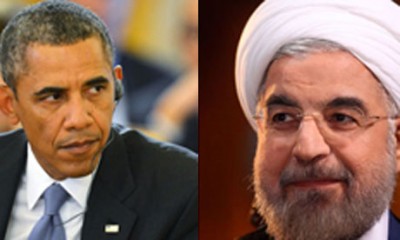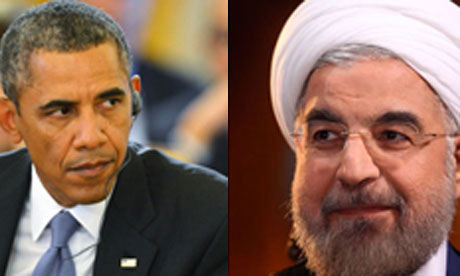 By Max Boot
By Max Boot
Back in January, Michael Doran and I had an op-ed in the New York Times arguing that the Obama administration was pursuing a grand realignment of Middle East politics which would turn Iran from an enemy into “a cooperative partner in regional security.” I am reminded of that argument when I now hear the State Department spokesman claim that the U.S. and Iran have a “shared interest” in pushing back against the Islamic State of Iraq and Syria and when I read Tom Friedman claim it’s actually in our interest to let Iran dominate substantial chunks of the region: “Iran wanted to be the regional hegemon. Well, Suleimani: ‘This Bud’s for you.’ Now your forces are overextended in Syria, Lebanon and Iraq, and ours are back home. Have a nice day.”
Is it really necessary to point out that letting Iranian forces dominate Syria, Lebanon, and Iraq is a win for Iran–not for the United States? It is possible to turn this Iranian commitment from an advantage to a disadvantage, but to do so the U.S. would have to wage active proxy warfare against Iran as it once did against the Soviet Union in Afghanistan (or as Iran did against us in Iraq and Lebanon). This would involve dramatically ramping up aid (including possibly air strikes) to support the non-jihadist opposition in Syria, which is eager to fight both the Iranian-backed and the al-Qaeda-backed extremists, and to possible partners in Iraq such as the Sunni tribes (if we can still find any left who are stupid enough to trust American assurances of support). But President Obama shows no sign of doing that. Absent a much more active American role to oppose Iranian designs, the mullahs will be able to live out their dreams of regional hegemony at relatively small cost.
Is this actually in America’s interest because Iran as a Shiite nation opposes Sunni extremists? No, because that analysis is far too simplistic. In the first place, as Doran and I pointed out, Iran has made common cause in the past with Sunni extremists in Hamas, the Taliban, and al-Qaeda, among others. It’s true that Iran doesn’t want to see ISIS or the Nusra Front, another al-Qaeda-affiliated group, dominate Iraq or Syria. But that’s because it would like to see those states dominated by its own proxies who are every bit as bad–Lebanese Hezbollah, Khataib Hezbollah (the Iraqi version), Asaib Ahl al-Haq (another Iraqi Shiite terrorist group), and other actors including to a large extent Bashar Assad and Nouri al-Maliki who are both becoming, in the absence of American intervention, lock-step Iranian allies.
This is not an outcome remotely in American interests. As Doran and I argued, the increasing Iranian prominence will only drive Sunnis, who constitute the region’s vast majority, into greater militancy. Do you honestly think Saudi Arabia, Qatar, and the UAE will stand by and watch Iran and its stalking horses take control of Iraq, Syria, and Lebanon? Not a chance. They will amp up their aid to ISIS and other Sunni extremist groups and you will see the murderous Syrian civil war spill over into Iraq.
While some may take satisfaction from Sunni and Shiite extremists clashing, the problem is that they could both win–i.e., both sides could gain control of significant territory which will then become terrorist states. That is what has already happened in Syria and it is now likely to happen in Iraq as well. While the Iranians would prefer obviously that ISIS not control any territory in Iraq or Syria, they may well be willing to live with some ISIS control if the payoff for them is that their proxies consolidate control over what remains of those two states.
Put bluntly, the U.S. interest is in creating democratic, stable, and pro-Western regimes; the Iranian interest is in creating fundamentalist, terrorist-supporting, Shiite-extremist regimes. There is no overlap of interest except when we make the mistake of backing Iranian-aligned leaders such as Nouri al-Maliki. We made that mistake in 2010 when both the U.S. and Iran worked, after the last Iraqi election, to help Maliki win a second term as prime minister. Please, let’s not make that mistake again. The Iranians are pushing for a third term for Maliki. Let’s push for ABM–Anybody but Maliki. Iraq will not survive four more years of Shiite sectarian leadership.
Commentary Magazine


Leave a Reply
You must be logged in to post a comment.